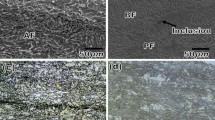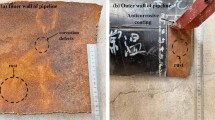Tensile and fracture properties of X80 pipeline steel were studied in a mimic petrochemical environment. X80 pipeline steel specimens were firstly exposed to air or H2S corrosive medium. Then their tensile properties and δ-∆a resistance curves were obtained in experiments. The influence of H2S corrosion on the X80 pipeline steel’s crack growth resistance curve, fracture toughness, and plastic work loss was analyzed. The comparison between the test results after two pretreatments indicates that there was no significant difference in the X80 pipeline steel’s ultimate tensile strength before and after H2S corrosion. But fracture elongation, area reduction and fracture toughness varied greatly (a substantial decrease in elongation and reduction of area). The crack growth resistance curve of the specimen in air was obviously higher than the crack growth resistance curve of the corroded one. Under stable crack growth stage, the crack initiation toughness δ 0.2BL of the specimen in air was 0.732 mm, 2.02 times that of the corroded one (0.364 mm). In the case of similar crack growth ∆a, the plastic work required in the crack growing process (UP) of the specimen in air was 2.29 times that of the H2S-corroded specimen (\( {U}_P^{\hbox{'}} \) ). H2S corrosion resulted in a significant reduction of the fracture toughness of X80 pipeline steel. Hence, H2S corrosion should be avoided in the process of natural gas transportation by pipelines, so as to protect the pipeline steel from toughness degradation.








Similar content being viewed by others
References
L. Zheng and S. Gao, “Research and trial production of X80 pipeline steel with high toughness using acicular ferrite,” Engineering, 3, No. 3, 91–94 (2005).
E. Sosa and J. Alvarez-Ramirez, “Time-correlations in the dynamics of hazardous material pipelines incidents,” J. Hazard. Mater., 165, Nos. 1–3, 1204–1209 (2009).
J. L. Alamilla, M. A. Espinosa-Medina, and E. Sosa, “Modelling steel corrosion damage in soil environment,” Corros. Sci., 51, No. 11, 2628–2638 (2009).
Y. T. Xi, D. X. Liu, H. P. Cai, et al., “Stress corrosion cracking behavior of domestic X80 pipeline steel in H2S environment,” Corros. Sci. Prot. Technol., 19, No. 2, 103–105 (2007).
B. Y. Wang, L. X. Huo, Y. F. Zhang, and D. P. Wang, “H2S stress corrosion test of welded joint for X80 pipeline steel,” Pres. Ves. Technol., 23, No. 7, 15–18 (2006).
Y. Chen, J. Y. Fei, B. H. Wan, and L. Wang, “Stress corrosion crack of buried X80 oil pipeline and its protection,” Hot Work. Technol., 40, No. 22, 55–59 (2011).
GB/T 228.1-2010. Metallic Materials – Tensile Testing – Part 1: Method of Test at Room Temperature, Chinese National Standard (2010).
GB/T 21143-2007. Metallic Materials – Unified Method of Test for Determination of Quasistatic Fracture Toughness, Chinese National Standard (2007).
NACE TM0177-2005. Laboratory Testing of Metals for Resistance to Sulfide Stress Cracking and Stress Corrosion Cracking in H 2 S Environments, NACE International (2005).
NACE MR0175-2003. Standard Material Requirements – Metals for Sulfide Stress Cracking and Stress Corrosion Cracking Resistance in Sour Oilfield Environments, NACE International (2003).
NACE TM0284-2011. Evaluation of Pipeline and Pressure Vessel Steels for Resistance to Hydrogen-Induced Cracking, NACE International (2011).
P. Y. Wang, J. Wang, S. Q. Zheng, et al., “Effect of H2S/CO2 partial pressure ratio on the tensile properties of X80 pipeline steel,” Int. J. Hydrogen Energ., 40, No. 35, 11925–11930 (2015).
T. Depover, E. Van den Eeckhout, and K. Verbeken, “Hydrogen induced mechanical degradation in tungsten alloyed steels,” Mater. Charact., 136, 84–93 (2018).
GB/T 8650-2015. Evaluation of Pipeline and Pressure Vessel Steels for Resistance to Hydrogen-Induced Cracking, Chinese National Standard (2016).
C. Chen, Q. G. Cai, and R. Z. Wang, Engineering Fracture Mechanics [in Chinese], National Defense Industry Press, Beijing (1977).
Q. F. Li, Fracture Mechanics and the Engineering Application [in Chinese], Harbin Engineering University Press, Harbin (2007).
W. Y. Chu, L. J. Qiao, J. X. Li, et al., Hydrogen Embrittlement and Stress Corrosion Cracking [in Chinese], Science Press, Beijing (2013).
Q. Hong and Y. X. Chen, “Effects of static and dynamic hydrogen charging on tensile properties of SM490B clean steel,” Shanghai Met., 34, No. 1, 25–28, 37 (2012).
J. Wang, X. Y. Li, and Y. L. Zhang, “Low cycle fatigue crack growth rate in H2S environments,” J. Mech. Strength, 31, No. 3, 972–978 (2009).
A. A. de Araújo, F. L. Bastian, and E. M. Castrodeza, “CTOD-R curves of the metal-clad interface of API X52 pipes cladded with an Inconel 625 alloy by welding overlay,” Fatigue Fract. Eng. M., 39, No. 12, 1477–1487 (2016).
ASTM E1820-01. Standard Test Method for Measurement of Fracture Toughness, ASTM International, West Conshohocken, PA (2001).
E. V. Chatzidouros, V. J. Papazoglou, T. E. Tsiourva, and D. I. Pantelis, “Hydrogen effect on fracture toughness of pipeline steel welds, with in situ hydrogen charging,” Int. J. Hydrogen Energ., 36, No. 19, 12626–12643 (2011).
Acknowledgments
This article is supported by National Key Research and Development Program of China (Project No. 2016YFC0801905-16).
Author information
Authors and Affiliations
Corresponding author
Additional information
Translated from Problemy Prochnosti, No. 1, pp. 163 – 174, January – February, 2019.
Rights and permissions
About this article
Cite this article
Gu, L., Wang, J., Luan, C.B. et al. Influence of H2S Corrosion on Tensile Properties and Fracture Toughness of X80 Pipeline Steel. Strength Mater 51, 145–155 (2019). https://doi.org/10.1007/s11223-019-00060-1
Received:
Published:
Issue Date:
DOI: https://doi.org/10.1007/s11223-019-00060-1




